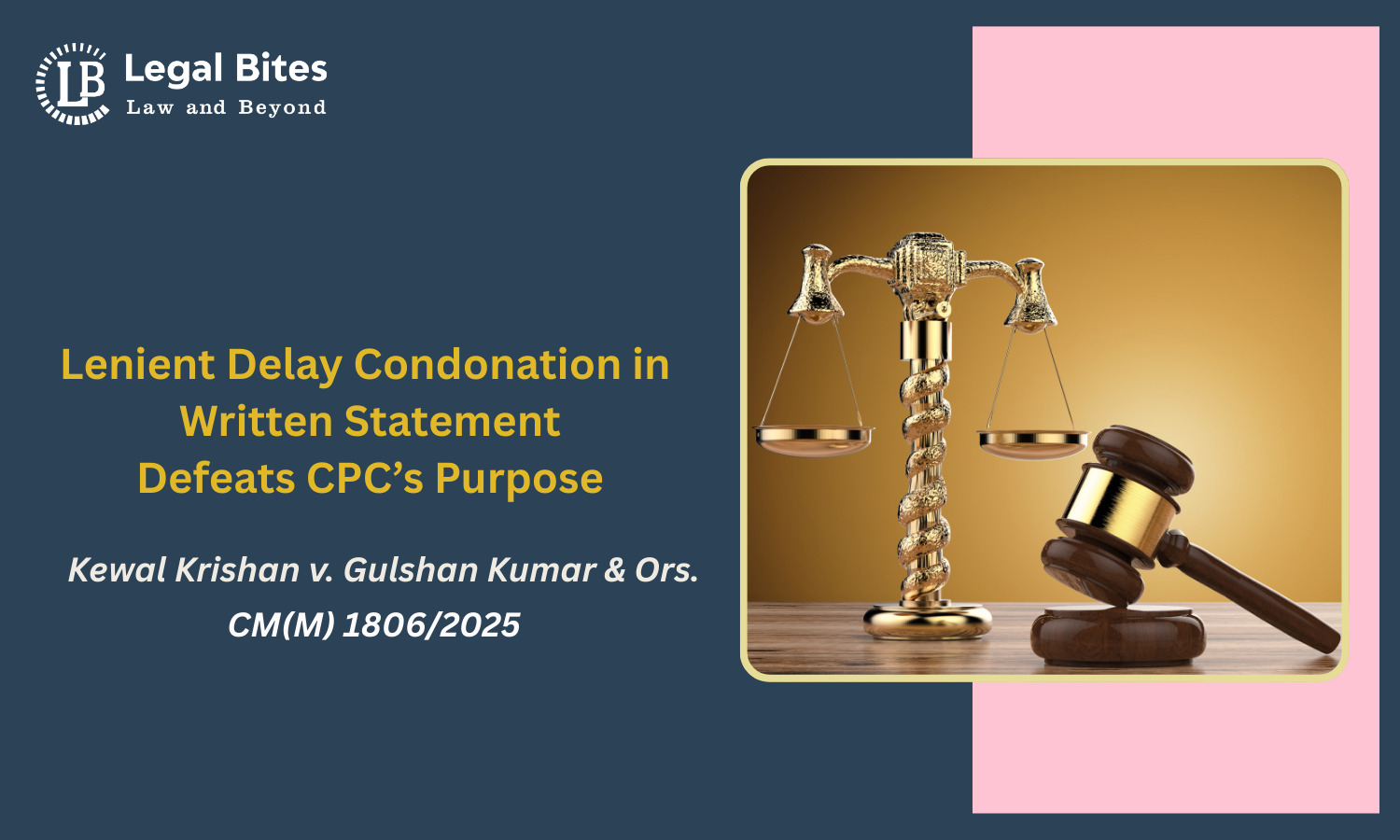
The Code of Civil Procedure, 1908 (CPC), as amended by the 2002 reforms, sought to make civil trials more efficient and time-bound. A key component of this reform was the introduction of stricter timelines for filing written statement by defendants under Order VIII Rule 1 CPC. Delhi High Court’s decision in Kewal Krishan v. Gulshan Kumar & Ors. (2025) underscores the judiciary’s reluctance to allow a “casual” approach in condoning delays.
The Court made it clear that condoning delay without exceptional circumstances would frustrate the purpose of procedural discipline and make the provision redundant.
Factual Background
- The plaintiff (respondent no. 1) filed a suit for declaration, injunction, and other reliefs against the defendant (petitioner Kewal Krishan) and other respondents.
- Summons were served on the defendant on 19 December 2024. Under Order VIII Rule 1 CPC, the defendant was required to file a written statement within 30 days, extendable up to 90 days at the court’s discretion.
- The defendant failed to file within this period. Consequently, on 1 April 2025, the trial court closed his right to file a written statement.
- A month later, on 1 May 2025, the defendant applied for recall of the order and condonation of delay, arguing that he was awaiting certified copies of records from another litigation necessary for drafting the written statement.
- The trial court rejected this plea, holding that obtaining certified copies was not an “exceptional circumstance” and merely a ruse to justify delay.
When this order was challenged before the Delhi High Court, Justice Girish Kathpalia upheld the trial court’s reasoning and dismissed the petition.
Issues Before the Court
- Whether the trial court erred in refusing to condone the delay in filing the written statement?
- Whether awaiting certified copies from another case constituted “exceptional circumstances”?
- Whether courts must adopt a lenient approach in condoning delays to ensure substantive justice?
Court’s Observations
Strict Timeline Under CPC
- The Court reiterated that the statutory right to file a written statement expires after 30 days from service of summons, extendable up to 90 days.
- Beyond this, courts retain discretion to condone delay, but only in exceptional circumstances, not as a matter of routine.
Defendant’s Excuse Not Convincing
- The reason advanced—that certified copies from another litigation were needed—was dismissed.
- The Court noted that those documents were at best evidence and not essential facts to be pleaded in the written statement.
- The defendant could have pleaded the basic objection (lack of lawful attorneyship of plaintiff no. 1) without awaiting copies.
Purpose of Procedural Amendments
- The 2002 amendment to CPC aimed to reduce delays and prevent abuse of procedural laxity.
- Taking a lenient view, as argued by the petitioner, would “make Order VIII Rule 1 CPC completely otiose” and frustrate its objective
No Infirmity in Trial Court’s Order
- The trial court’s conclusion—that the plea for certified copies was a ruse—was upheld.
- The High Court emphasised that condonation of delay cannot be claimed as a matter of right but requires demonstration of diligence and genuine impediment.
Legal Principles Reaffirmed
- Order VIII Rule 1 CPC is directory but not toothless: Courts may allow delayed filing only when justified by compelling circumstances.
- Discipline v. Discretion: Judicial discretion to condone delay must be exercised sparingly, else the discipline intended by procedural law collapses.
- Evidence v. Pleadings: Defendants cannot delay filing pleadings on the pretext of awaiting documents that could be produced later in evidence.
Implications of the Judgment
Message to Litigants
- Defendants must act diligently and cannot casually expect condonation of delay.
- Legal representatives must ensure written statements are prepared on time, even with incomplete records.
Judicial Efficiency
- The ruling strengthens the courts’ stance on curbing adjournments and unnecessary delays in civil trials.
- It reinforces the intent of CPC amendments—ensuring time-bound progress of suits.
Precedential Value
- The decision aligns with earlier Supreme Court rulings (Kailash v. Nanhku, (2005) 4 SCC 480; SCG Contracts v. K.S. Chamankar, (2019) 12 SCC 210), which cautioned against routinely condoning delay.
- It adds another precedent where “leniency” was expressly rejected.
Conclusion
Delhi High Court’s ruling in Kewal Krishan v. Gulshan Kumar & Ors. is a vital precedent in curbing procedural laxity. By holding that leniency in delay condonation of written statements will undermine CPC’s objective, the Court reaffirmed the purpose of the 2002 CPC amendments: to ensure speed, efficiency, and fairness in civil trials.
This decision should guide litigants, lawyers, and courts alike to uphold procedural discipline and resist the temptation of casual condonation of delays.
Important Link
Law Library: Notes and Study Material for LLB, LLM, Judiciary, and Entrance Exams